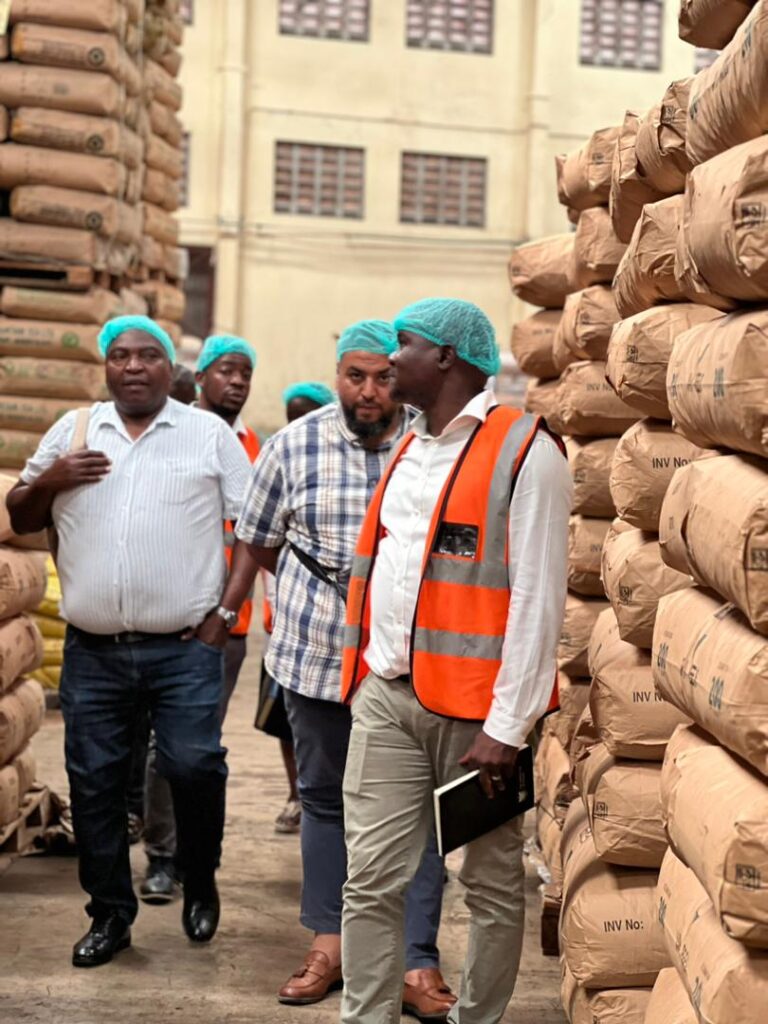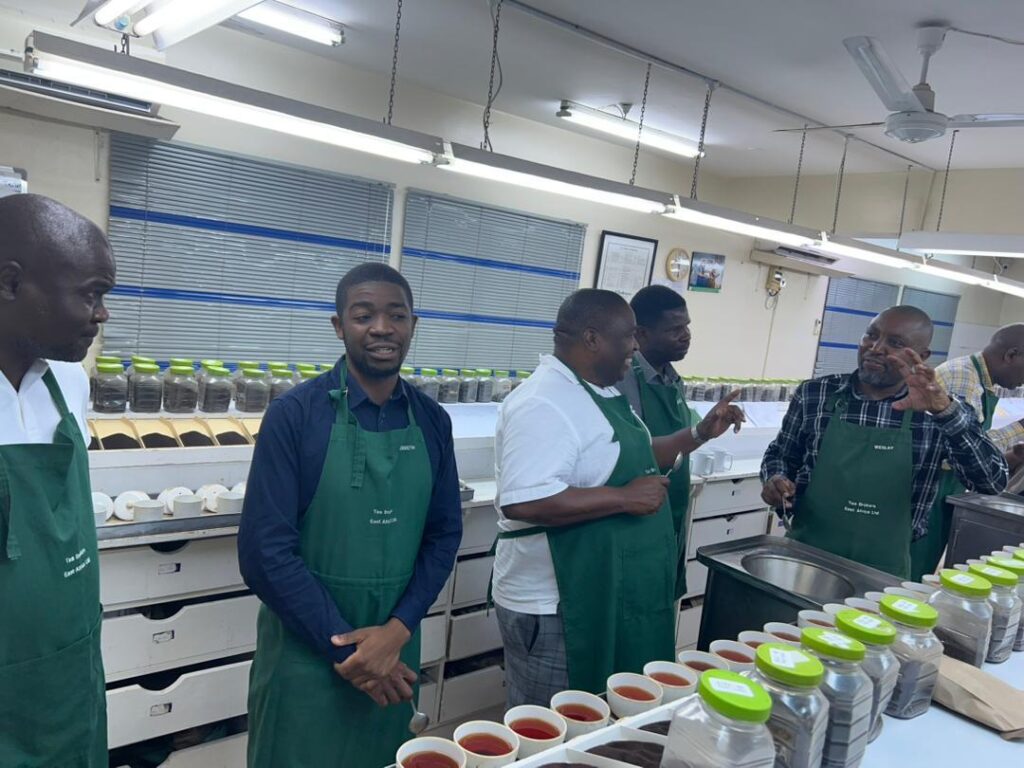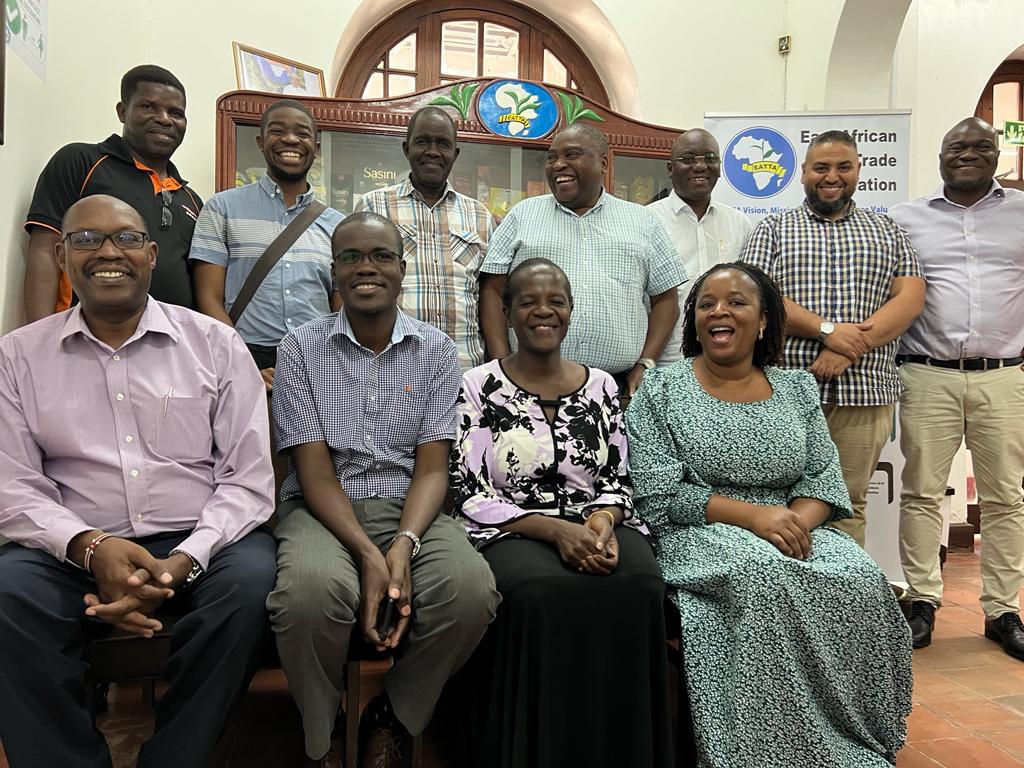TAML and EATTA teams meet to celebrate the Malawi delegation’s visit to Kenya.
The tea industry is changing quickly as new technology and automation take hold of the sector around the world. A delegation from the Tea Association of Malawi (TAML), in collaboration with the RECLAIM Sustainability! programme, recently visited the Mombasa Tea Auction in Kenya to learn how to adapt and grow the Malawi tea sector.
The tea industry has been a cornerstone of Malawi’s economy and a primary source of employment for decades, but new challenges have forced a reckoning. The fact-finding trip represents a step to begin addressing declining tea prices, aging tea bushes, inadequate infrastructure, lack of tea processing equipment, and low quality tea.
The delegation to Kenya included a smallholder producer, two brokers, two Tea Association of Malawi members, and two representatives from Solidaridad’s RECLAIM Sustainability! Project. The visitors examined the recently automated auction hosted by the East African Tea Trade Association (EATTA).
The delegation plans to apply their learnings to the Limbe Tea Auction, the largest auction platform in Malawi. It is hoped that technological improvements will enhance efficiency, increase stakeholder participation, expand market accessibility, and attract customers.
During the visit to Kenya the Malawan delegation specifically sought to:
- Understand the implementation of the e-auction system in Mombasa and evaluate its applicability to the Limbe Tea Auction.
- Identify the challenges encountered during the transition to e-auctions in Kenya.
- Examine how e-auctions have benefited the Kenyan tea industry.
- Seek actionable insights and recommendations to optimize Limbe auction efficiency, elevate participation rates and bolster tea prices.
The potential for better prices through e-auctions will be a game-changer for all of the smallholders. Increased competition among buyers will translate to improved profit margins, this will result in improved incomes for the local farmers and help women and youth.
Dickson Nyalungwe, National Smallholder Tea Growers
Insight and transformation
African tea production can be divided into two main regions, and while producers in East Africa generate significant revenue on the global market, the smaller tea sector in Southern Africa remains at a competitive disadvantage.
To date, Malawi continues to rely on a manual auction system that uses the outcry system and requires the physical attendance of participants. The Limbe Tea Auction market in Blantyre involves two brokers, ten tea producers and fourteen large buyers. Due to the low number of participants, producers have limited access to buyers, which weakens their bargaining power and affects their livelihoods.
As part of the delegation’s mission in Kenya, they engaged with key industry stakeholders, including tea warehouse operators and brokers. They learned of crucial tea trading practices and gained valuable insights into the process of implementing an automated auction system.

The EATTA played a pivotal role in the educational visit’s success. Allowing delegates to witness the e-auction first-hand, the delegates were able to explore the Integrated Tea Trading System (ITTS)—an automated tea trading system that enables efficient bidding within the industry. Delegation members immediately recognized the transformative potential of an e-auction.
“Having seen the e-auction in operation in Mombasa, I think its key strengths lie in speed and convenience for buyers,” noted Tonda Chinangwa, theTAML CEO. “It boosts participation, especially for those unable to participate in lengthy traditional auctions,” he adds.
Though automation offers significant benefits in efficiency, collaboration, and standardization, the transition in Malawi may not be simple. The delegation acknowledged that there are ongoing challenges related to stakeholder engagement, initial adoption rates, resource-intensive maintenance and limited government support. These challenges highlight the complex coordination required to ensure the adoption and sustainability of automated auctions.
Lessons learned
Following their visit, the delegates remain committed to the transformation of the Malawian tea sector. The delegation realized the importance of establishing a sustainable funding model and robust infrastructure to transform the tea sector.

Proposed initiatives include a formalized collaboration with EATTA through a Memorandum of Understanding (MOU) to create a visual representation that will outline the step-by-step progression towards an automated system in Malawi, while also exploring the possibility of an initial hybrid auction room for remote participation.
Donald Ngalawa, from Tea Brokers Central Africa, says, “As a broker, I really benefited from seeing how much more value brokers can provide to tea growers and producers by doing more due diligence in understanding the dynamics of the global tea market, particularly ever-changing market preferences. When brokers have a good grasp of market preferences, we can provide tailor made feedback to tea producers and consequently tea growers on the specific production tactics that result in the best tea prices.“
The returning delegates have compiled a comprehensive report that documents their findings and shares lessons from their trip. The next step will be to present their findings to industry players and lay the groundwork to propel the Malawi tea sector into the future.
It’s often said that people can’t embrace change until they see it in action. This shift can potentially create a positive ripple effect within the tea industry, benefiting not only Malawi but potentially other tea-producing countries like Mozambique in the future.
Nozipho Ndlovu, Programme Manager for RECLAIM Sustainability! Tea Malawi
Going forward, Malawi’s experience may help other tea-producing countries across the region. Moving towards automation in the Malawian tea sector and other changes have the potential to establish a regional and collaborative peer learning network across Southern Africa that can bring benefits to producers in the entire region.
RECLAIM Sustainability!
Solidaridad’s RECLAIM Sustainability! is a five-year programme (2021-2025) implemented in strategic collaboration with the Dutch Ministry of Foreign Affairs, and Fairfood, TrustAfrica and Business Watch Indonesia (BWI). Together with our partners, we strive to foster genuine and inclusive sustainability in global value chains, while including the voices of farmers, miners, workers and citizens in decision making in an effort to strengthen civil society.

